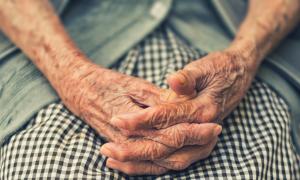The Gloria Soler Foundation funds a project of IrsiCaixa and the Catalan Health Institute to characterize long-term immunity against COVID-19 in the elderly

Thanks to this support, the researchers will study the degree of protection and the duration of the immune response against SARS-CoV-2 in elderly people living in nursing homes
Elderly people are more vulnerable to severe COVID-19 due to the coexistence of various diseases and a compromised immune. Being, therefore, a risk group, it is very important to devote efforts to characterize their level of protection against SARS-CoV-2, both after infection and vaccination. In this sense, IrsiCaixa and the North Metropolitan Primary Care of the Catalan Institute of Health (ICS) are studying, thanks to the support of the Gloria Soler Foundation, the degree of protection and the duration of the immune response in elderly people living in nursing homes, after receiving the vaccine or after natural infection. In addition, they will evaluate how immunosenescence affects the creation of an effective protective immune response. The results of this research will allow clinical decisions to be made, such as establishing a vaccination schedule based on the immune response.
So far, studies have shown that the immune response against SARS-CoV-2 is maintained at least one year after infection. However, most of these studies have been conducted in people younger than 65 years of age. "In the case of older people, the immune system is aged and this protective response may be less efficient and of shorter duration," explains Marta Massanella, principal investigator of the Translational Research in Immunology and Ageing (TRIA) group at IrsiCaixa. The ageing of the immune system that Massanella mentions is caused by immunosenescence, a process that immune system cells undergo over the years and that reduces their effectiveness in fighting pathogens.
The response of a weakened immune system
SARS-CoV-2 infection or vaccination activates the defences against the virus. Among other processes, this response consists of the activation of the immune system's B and T cells, which will produce antibodies to prevent new infections and eliminate infected cells, respectively. "The function of these cells in older people is not as effective as in youngers. That is why we want to characterize the immune response of elderly once they have been vaccinated, or after having passed the infection naturally and with different levels of severity," details Massanella. "Specifically, we want to determine the level and quality of the response," she adds.
"The samples obtained in the nursing homes will be used to evaluate the quantity and effectiveness of the antibodies generated, the cellular immune response and the level of cytokines produced, which are molecules associated with inflammation," explains Macedonia Trigueros, predoctoral researcher at IrsiCaixa.
Determine the duration of protection
Another objective of the study is to understand how long the protective effect of the immune system lasts after vaccination or COVID-19. "This information will increase understanding of the duration of the parameters related to immunity, which will allow us to decide whether it is necessary to adjust the vaccination schedule," explains Nuria Prat, director of the North Metropolitan Primary Care of the Catalan Institute of Health.
"For the elderly, vaccination is especially important, as it serves to prevent infection and, therefore, avoid severe cases, which are very common in people over 65 years of age. Being able to vaccinate this group has improved a lot the situation in nursing homes," adds Dolores Palacín, coordinator of the operational part of the study, from the Metropolitan Primary Care North of the ICS.